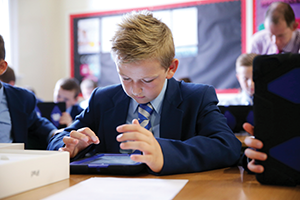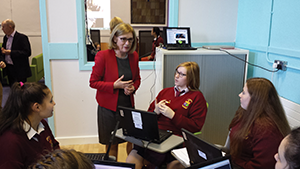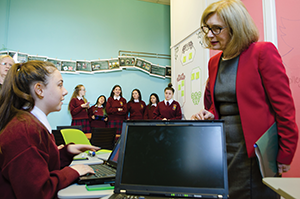Education’s digital strategy
 Adam Morton reviews the Department of Education and Skills’ Digital Strategy for Schools.
Adam Morton reviews the Department of Education and Skills’ Digital Strategy for Schools.
The Department of Education and Skills has recently published its Digital Strategy for Schools. The strategy sets out a comprehensive list of actions to be achieved and outlines the department’s plan for enhancing teaching, learning and assessment through ICT over the next five years.
Supporting this strategy is a €210 million investment in digital technology that Education and Skills Minister Jan O’Sullivan TD claims is “the most substantial funding ever made available in this area.” The strategy is designed to embed ICT more deeply across the system to enhance the overall quality of Irish education and takes into consideration the current education reforms already underway at primary and post-primary level.
The strategy defines the department’s vision for ICT integration in schools as one that allows pupils to “realise the potential of digital technologies to enhance teaching, learning and assessment so that that Ireland’s young people become engaged thinkers, active learners, knowledge constructors and global citizens to participate fully in society and the economy.” In order to achieve this the strategy has been developed around four key themes.
Teaching, learning and assessment using ICT
The first of these key themes is teaching, learning and assessment using ICT. The department recognises that ICT can play a central role in transforming teaching, learning and assessment practices for both teachers and students and that an essential part in enabling students to learn effectively must include improved delivery of ICT at all levels. The strategy aims to provide advice and guidance for teachers and schools, including examples of good practice on the use of ICT in teaching. The department has also made a commitment to provide clear statements regarding digital skills and learning outcomes throughout the lifetime of the strategy.
The UNESCO ICT Competency Framework for Teachers will be adopted to provide schools with greater clarity around the concept of ICT integration. However, it will not be adapted verbatim. The department recognises that as it has been developed for teachers around the globe, there is a need to tailor the code for the Irish education system. It is the department’s belief that the localisation of the framework will allow support services to provide more appropriate support materials and services to the principals and teachers who will be tasked with embedding ICT into their practice. The department has made this framework a central pillar of their strategy and will be constantly reviewing it at various intervals and levels between 2015 and 2020.
 Teacher professional learning
Teacher professional learning
The second of these key themes is teacher professional learning. Teaching staff in schools will play a vital role in ensuring ICT integration is secured and the department is committed to ensuring that every teacher in the Irish education system is equipped with the knowledge, skill and confidence to integrate ICT into their practice. To ensure this becomes a reality, the use of ICT will be embedded at each stage of the teaching training continuum, right through their initial teacher training, induction process and their continuous professional development. The department feels that undertaking this process will give teachers multiple opportunities to become more knowledgeable and confident in achieving ICT integration. The Teaching Council’s policies on teacher education will also be adapted to reflect the role and potential of ICT to enhance teaching and learning in schools.
All future teacher professional learning opportunities will be informed by the adapted UNESCO ICT Competency Framework for Teachers ensuring that the department’s support services will also be encouraged to embed the use of ICT development and delivery in its systems. The strategy will also aim to provide schools with guidance and examples of good practice on the effective, critical and ethical use of ICT teaching, learning and assessment that will reflect real classroom practice in action.
Leadership, research and policy
The strategy’s third theme is focused on leadership, research and policy. It is the department’s belief that in order to truly integrate ICT across the education system, distributed leadership is essential. The department is fully aware that its leadership in supporting schools will not be enough on its own to ensure effective integration. It feels that school management and other key stakeholders will play a paramount role and it is their leadership and ownership of the challenge that will ensure the strategy succeeds.
The strategy also places an emphasis on the importance of ensuring there is a strong research-base across the entire system in order to ensure the best levels of ICT integration. The department also believes that it is important that schools and other education providers, capture and share innovative practice with the wider teaching community.
 However, the strategy also includes an acknowledgement that ICT has the potential to be misused in schools. To combat this, the department plans to provide guidance, planning resources and related supports for the effective and ethical use of ICT to school leaders and teachers. The department will also ensure that schools can link their ICT systems to existing school policies to further embed ICT deeply within the school.
However, the strategy also includes an acknowledgement that ICT has the potential to be misused in schools. To combat this, the department plans to provide guidance, planning resources and related supports for the effective and ethical use of ICT to school leaders and teachers. The department will also ensure that schools can link their ICT systems to existing school policies to further embed ICT deeply within the school.
ICT infrastructure
In recent years, there has been heavy investment in ICT infrastructure, specifically in the rollout of broadband services to all post-primary schools and a number of special schools with post-primary students. The rollout to primary schools will commence during the lifetime of this strategy and as such, the strategy will provide advice and support to schools in relation to internet usage by school pupils.
The department recognises the increasing importance of the internet in all our lives and has noted the increase in cloud computing in education and the increase in pupils bringing their own devices to school. The strategy will offer advice and support to schools in relation to these new trends and recognises the need to ensure that schools can get appropriate technical support. To address this, the department will assess a number of technical support options to provide the best technical solution for schools.
The strategy has also planned for the necessity of ICT upgrades during the life of the plan and states that the department will work with the Office of Government Procurement and the School Procurement Unit to ensure the provision of frameworks and advice for the purchase of equipment such as printers, desktop PCs and notebooks. Funding for such equipment will be provided for in the form of school grants.





